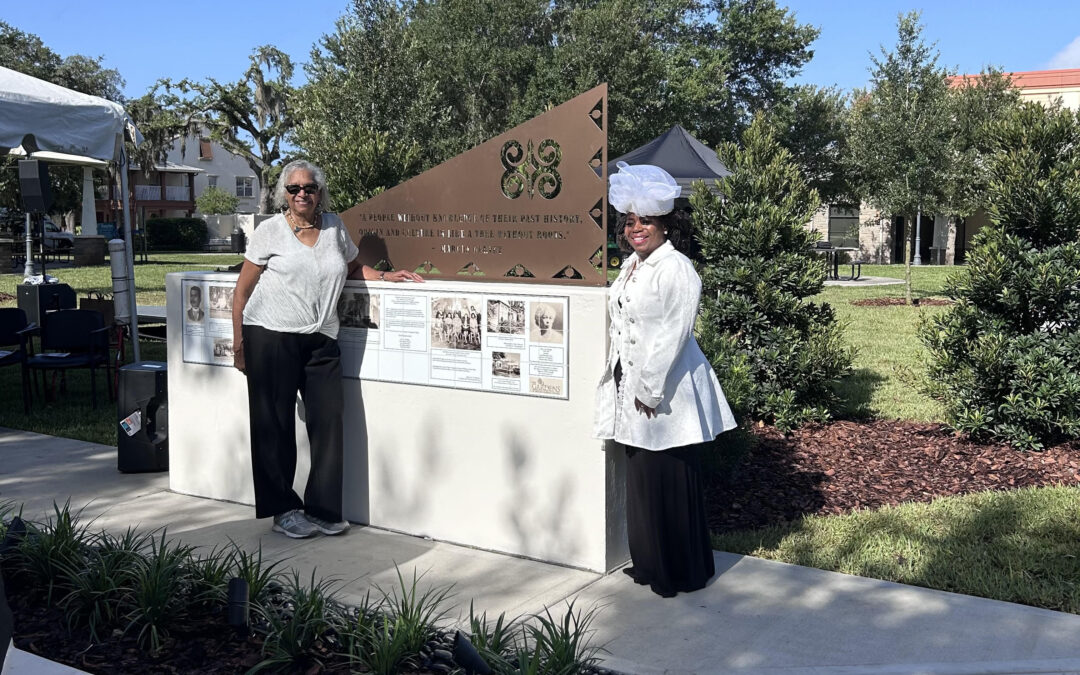
by Beth Kassab | Aug 3, 2024 | City Commission, Historic Preservation, News, Uncategorized
City dedicates Shady Park Pioneer Memorial
The busts honor Black residents central to the history of Winter Park and the Hannibal Square community
Aug. 3, 2024
By Charles Maxwell
Winter Park on Saturday dedicated the Shady Park Pioneer Memorial, which honors central Black figures in the city’s origin and development and underscores the significance of the Hannibal Square community.
The memorial, which is next to Winter Park Community Center on New England Avenue, represents the endurance of Hannibal Square with four busts of key historical figures: Mary Lee Depugh (1878-1949), founder of the Ideal Woman’s Club;, Gustavus Christopher “Gus” Henderson (1862-1917), activist and founder of The Advocate and Frank R. Israel (1848-1925) and Walter B. Simpson (1859-1915) who both served as town aldermen.
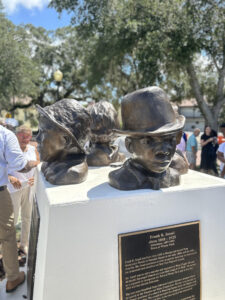
The new Pioneer Memorial at Shady Park honors Black residents central to the city’s history. (Photo by Charles Maxwell)
Behind the busts is a pyramid with a small sculpture of elephant tusks, which signify Hannibal Square, said memorial artist George Gadson.
“The elephants represent symbols of strength, wisdom, and longevity,” Gadson said. “Their ability to overcome obstacles perfectly resembles these pioneers.”
Today the black population in Winter Park has shrunk as the city’s west side has largely been redeveloped. But advocates say that makes the history lesson highlighted by the memorial even more relevant.
“It’s crucial for everybody to know their history, where they come from,” said Maria Olivia Bryant, who grew up in the Winter Park and Eatonville area and has long pushed for the memorial. “It’s especially important for children to know and learn about their own culture, and that’s what the memorial is here for … If you know your history, it aligns you with your purpose.”
Founded in 1881, just 14 years after Florida reentered the Union after seceding and co-founding the Confederate States in 1861, Hannibal Square was home to free black families who provided labor and services to wealthy white residents.
Across from the busts in Shady Park is a history wall with the stories of the pioneers and a timeline of the community’s history. The memorial is set at the former site of Hannibal Square Elementary School, which was the very first public school for African American children in the Winter Park area, founded in 1883.
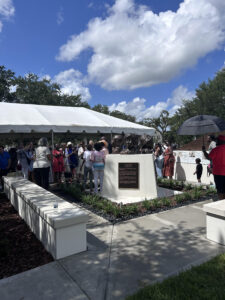
A crowd gathered Saturday at the memorial dedication at Shady Park.
Saturday’s dedication ceremony was crowded with local leaders and relatives of the pioneers. Mayor Sheila DeCiccio expressed her gratitude to community members who worked to make the memorial a reality.
“This has been a long time coming,” said DeCiccio.
Mary Daniels, a longtime resident and community leader who represented the MLK and Shady Park planning committee, gave remarks as well.
During the ceremony, Bryant led a historic dramatization that told the stories of the pioneers.
She noted how the idea for the memorial started more than 10 years ago, but it wasn’t until 2022 when a plan was really set into motion.
“For the past 20-25 years, there were conversations, promises and denials … through working, and coming together, it was finally brought back up.”
Bryant credits the City Commission in 2022 with pushing the concept forward.
When we brought it back up at that meeting, the commissioners and [former] Mayor [Phil] Anderson heard us,” Bryant said. “Actually, they didn’t just hear us. They felt us, they understood us.”
Anderson, who attended the ceremony Saturday, said he was just a part of the process that started before he was even in office.
“We had the opportunity to allocate certain funds… about half a million dollars to Shady Park as well as the MLK Jr. Park memorial,” said Anderson. “The committee that ran with it has been working on this for a long time. I don’t know if I’ve seen a prouder moment in Winter Park.”
WinterParkVoiceEditor@gmail.com
To comment or read comments from others, click here →
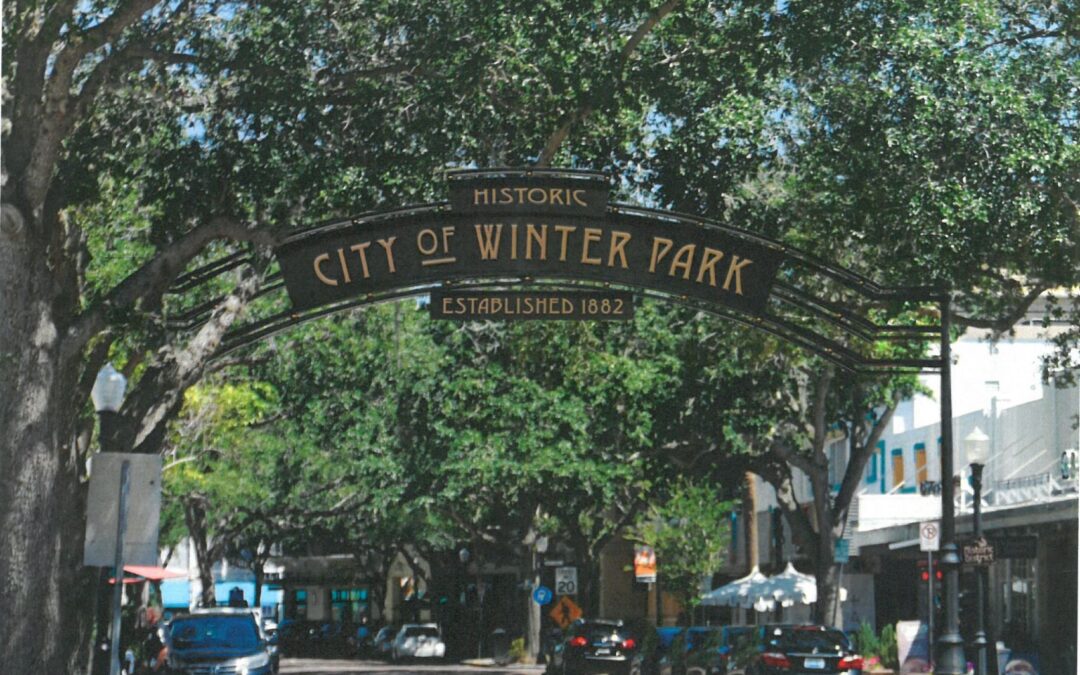
by Beth Kassab | Jun 27, 2024 | City Commission, Historic Preservation, News
Historic archways approved for Park Avenue
The signs are a legacy project spearheaded by longtime Planning Director Jeff Briggs
June 27, 2024
By Beth Kassab
A $400,000 installation of archway signs on both ends of Park Avenue is underway with the City Commission’s approval on Wednesday of a vendor for the job.
Don Bell Signs of Port Orange was selected to create the archways with $200,000 in public dollars from the city’s Community Redevelopment Agency and the other half covered by private donations.
Jeff Briggs, who is retiring after 47 years in the city’s planning department, recruited the private dollars himself for the project he sees as a legacy for historic preservation.
He noticed other cities had highly-visible signage to showcase their history but Winter Park had none.
“These will be landmark signs,” he said, noting others are now already in place at Dinky Dock, the Winter Park Women’s Club and other locations.
The private donors, who contributed $25,000 each are: Mike and Gail Winn; Larry and Joy Williams; Allan Keen; Rick Baldwin; Jim Barnes; the Joe & Sarah Galloway Foundation; the Edyth Bush Charitable Foundation and the Morse/Genius Foundations.
WinterParkVoiceEditor@gmail.com
To comment or read comments from others, click here →
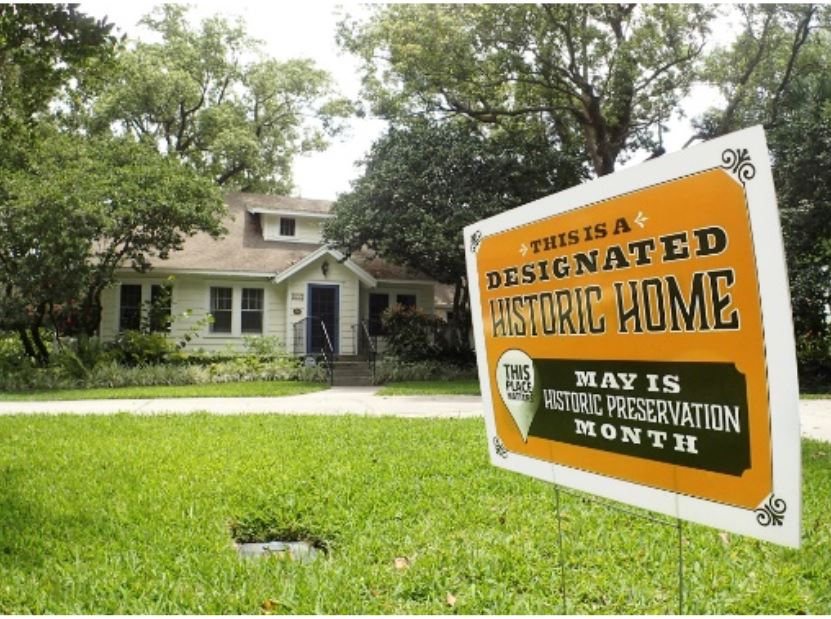
by Beth Kassab | May 7, 2024 | Historic Preservation, News, Uncategorized
Orange signs? All about historic preservation in Winter Park
May marks a time for awareness about historic properties and their value to communities like Winter Park
May 7, 2024
By Beth Kassab
Just as those election yard signs are disappearing, Winter Parkers might notice another sign popping up in yards across the city — Orange reminders of May as Historic Preservation Month.
Residents of historic homes are pulling out their signs as a visual reminder of the importance of preserving past architecture and charm to maintain the city’s vibrant character.
Winter Park’s Historic Register lists more than 120 homes and continues to grow each year.
Historic districts in the city include College Quarter, Virginia Heights East, Interlachen Avenue and the downtown area centered on Park Avenue.
Those in need of signs can contact the following: Sally Flynn: flynnlinks@aol.com; Stephen Pategas: spategas@hortusoasis.com or John Skolfield: john@skohomes.com
WinterParkVoiceEditor@gmail.com
To comment or read comments from others, click here →
by Anne Mooney | Jan 14, 2020 | Custom Author, Headline, Historic Preservation, Library, Orange Avenue Overlay, Zoning and Development
Marathon Monday Stretches into Terrible Tuesday
Meeting Will Continue on Thursday, Jan. 16
by Anne Mooney / January 14, 2020
Yesterday’s estimate of a five-and-a-half-hour Commission meeting missed the mark by a mile. For an unprecedented 11 hours, Commissioners struggled to make sense of two of the largest projects ever undertaken by this city – and failed.
OAO Discussion Continued to Thursday, Jan. 16
At 2:45 a.m., Commissioner Greg Seidel finally moved to pull the plug on the meeting, and the Commission agreed to ‘continue’ the Orange Avenue Overlay discussion on Thursday, January 16, at 11:00 a.m. Commissioners were advised to block out approximately four hours for the Thursday meeting.
At Thursday’s Continuance, Commissioners will vote on somewhere between 40 and 50 proposed amendments to the OAO ordinances.
As of this writing, the Thursday meeting is not on the January schedule of City meetings. Check the City website for updates or changes in dates and times. www.cityofwinterpark.org
Canopy Project
Earlier in the evening, the Canopy project met a similar fate. After an extended but inconclusive back-and-forth with the owner’s representative and the contractor, Brasfield & Gorrie, followed by the customary back-and-forth among the Commissioners regarding the Guaranteed Maximum Price (GMP), the item was tabled until the January 27 Commission meeting.
Commissioner Greg Seidel requested a Commission workshop to discuss such items as the contingency fund and possible sources of funds for the project. Likely funding sources include issuing the remaining $2 Million in bonds, the CRA, and the City’s General Fund. To date, the City has raised only about $2 Million of the promised $5.4 Million in donations.
Seidel also requested the results of Brasfield & Gorrie’s latest three large projects, to compare the (GMP) with actual costs upon delivery.
Agenda Angst
How the Canopy project and the Orange Avenue Overlay ended up on the same agenda is anyone’s guess, though there must be someone at City Hall who knows. The sheer volume of discussion and the number of amendments proposed is a clear indication that neither project is at a point where sufficient information has been digested for the Commission to come to a decision. The City needs to finish baking these cakes before anyone else cuts into them.
Record Crowd – Citizens Turned Away
Hundreds of people showed up at City Hall to listen or to speak. The building, including the downstairs lobby, was at capacity, and many citizens had to be turned away. Communications Director Clarissa Howard went through the crowd in the lobby and escorted those who wanted to speak up to the Commission Chambers and, in most cases, secured seating for them.
A Suggestion
Last night’s meeting demonstrated the folly of putting two mega-projects – especially ones around which there is a lot of positive and negative energy – on the same agenda.
The suggestion is the crafting of an ordinance that states, when a meeting is scheduled on a date certain, the meeting must be called to order and adjourned upon that date.
To comment or read comments from others, click here →
by Anne Mooney | Dec 10, 2019 | Custom Author, Headline, Historic Preservation
Waddell House Owners to Replace Porches
December 10, 2019 / by Geri Throne
Facing a daily city fine of $250, owners of Winter Park’s historic Waddell House told the city this week they plan to replace the rotted porches of the Victorian-styled structure.
“We want to work with the city not argue with the city,” David and Deborah Dunaway wrote in a letter dated December 9.
Last week, the city’s code compliance board ruled that the Dunaways violated the city’s historic preservation ordinance in July when they removed the home’s intricate two-story porch without a permit. It ordered the Dunaways to submit restoration plans in seven days or face a $250 fine for each day they remained in violation.
The letter included two sketches, one of the frontage of the house and the other of porch detail. “This is the first rendering of our plans to replace the rotted porches on our house at 1331 Aloma Ave.,” the letter stated. The sketches were said to be based on the home’s original design, as found in historic photos in the city library, and did not include “the add on or additions.” Additional architectural drawing and another permit application were promised to be submitted by Wednesday or Thursday of this week.
The home is named after William Waddell, a city pioneer who first occupied it. In 2005, long-time owners of the home had it put on the Winter Park Register of Historic Places before selling it. At the time, dense foliage in front of the home kept it mostly screened from view on busy Aloma Avenue. The Dunaways bought it in February of this year for $480,000 without an inspection. After they had the porch removed in the summer, highly visible blue tarps put over the front came loose, followed by months of rainwater intrusion.
At the code enforcement hearing, the couple’s attorney, Kevin Donaghy, asserted the house was structurally unsound. The Dunaways have “reached an impasse where they cannot afford to repair the entire home.” The Dunaways letter did not address how those structural issues would be addressed. Donaghy could not be reached for comment.
At a city commission meeting Monday, City Commissioner Todd Weaver and Mayor Steve Leary both praised city staff and the city Historic Preservation Board for their efforts toward preserving the structure.
To comment or read comments from others, click here →
by Anne Mooney | Nov 11, 2019 | Headline, Historic Preservation
Hannibal Square Historian Honored
Fairolyn Livingston Receives Cheney Award from Central FL Historical Society
 November 5 was a great day for Winter Park when the Historical Society of Central Florida bestowed the 2019 Cheney Award on Fairolyn Livingston, Chief Historian at the Hannibal Square Heritage Center.
November 5 was a great day for Winter Park when the Historical Society of Central Florida bestowed the 2019 Cheney Award on Fairolyn Livingston, Chief Historian at the Hannibal Square Heritage Center.
The Cheney Award is named for Judge Donald A. Cheney (1889 – 1983) who founded the Orange County Historical Society and the Orange County Historical Museum, predecessors of the current Historical Society and the Orange County Regional History Center. History Center Spokesperson Amanda Henry explained that The Cheney Award was created, “to recognize and honor those who have not chosen between the past and the future – but who understand the two are inseparable.”
“The award,” said Henry, “reminds us all of our champions of the Central Florida community who embody a love, reverence and unfailing dedication for our area’s history.”
Past Cheney Award recipients include the Orlando Sentinel’s Joy Wallace Dickinson (2013), Joseph Wittenstein of Rollins (2017) and James W. “Chief” Wilson (2018).
Fairolyn was honored for her work as Chief Historian at the Hannibal Square Heritage Center, where she has used her extensive research to enhance the permanent collection there. She has conducted interviews and written text for numerous exhibits, including the Center’s unique timeline installation, which juxtaposes significant events in local and national African American history.
She is a founding member of the team of documentarians, scholars and residents who in 2002 established the award winning show, The Heritage Collection: Photographs and Oral Histories of West Winter Park. This museum-quality documentary about the residents and history of Hannibal Square has been on permanent display since 2007, when the Heritage Center was established.
Fairolyn now devotes her time to the ongoing expansion of the Hannibal Square Heritage Center’s permanent collection, which includes “The Heritage Collection Phase IX: Hannibal Square Heroes (2017) and two phases of “The Sage Project: Hannibal Square Elders Tell Their Stories.”
The Cheney Award is only the latest in Fairolyn’s list of honors. She has received numerous awards and has shared the Hannibal Square community’s vibrant history with audiences across the state. In 2018, Winter Park Magazine recognized Fairolyn as one of Winter Park’s “Most Influential Citizens” for her contributions to understanding and preserving Central Florida’s history.
“Fairolyn Livingston’s invaluable research and outreach work have filled in many once-overlooked and under-appreciated chapters about a vital, important community centered around Hannibal Square in Winter Park,” said Orange County Historical Society Executive Director Michael Perkins. “We’re honored to present her with this award for her many contributions.”
To comment or read comments from others, click here →







Recent Comments